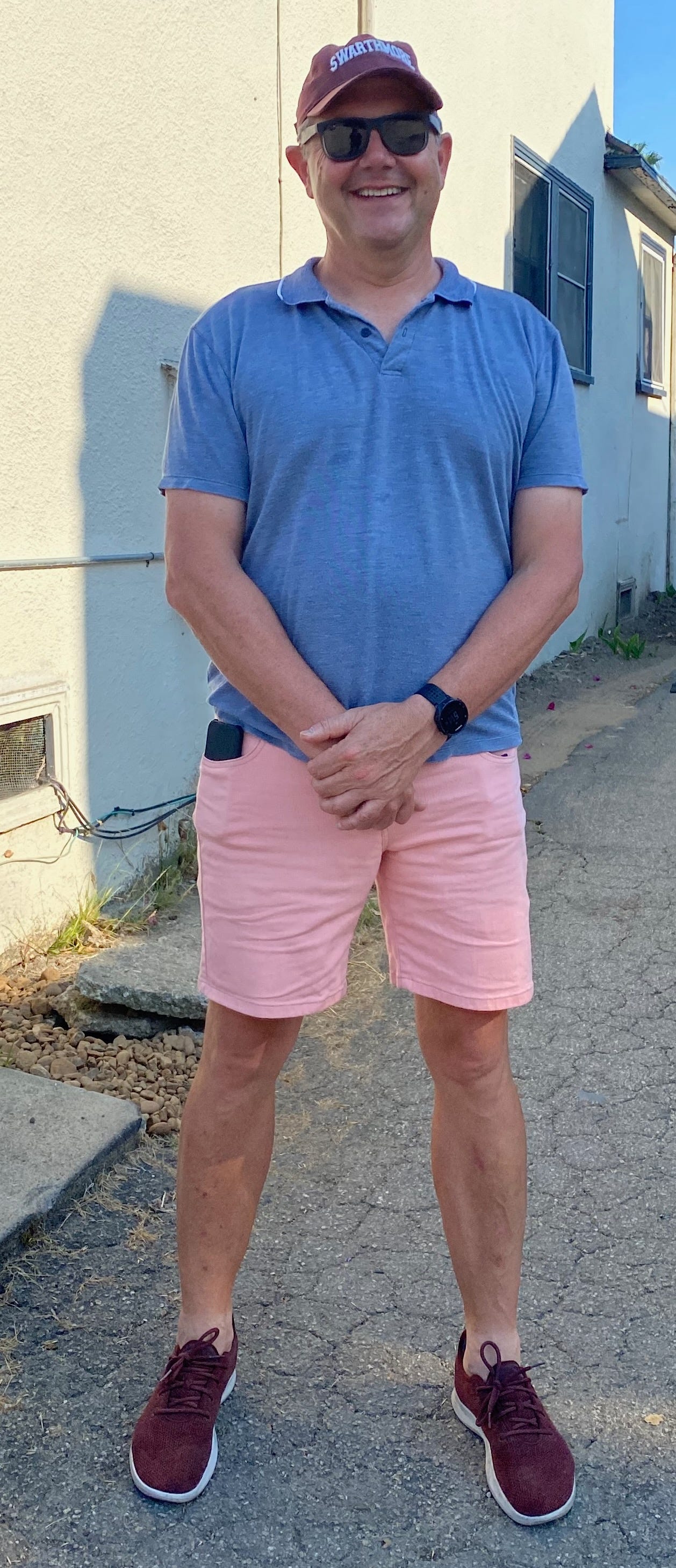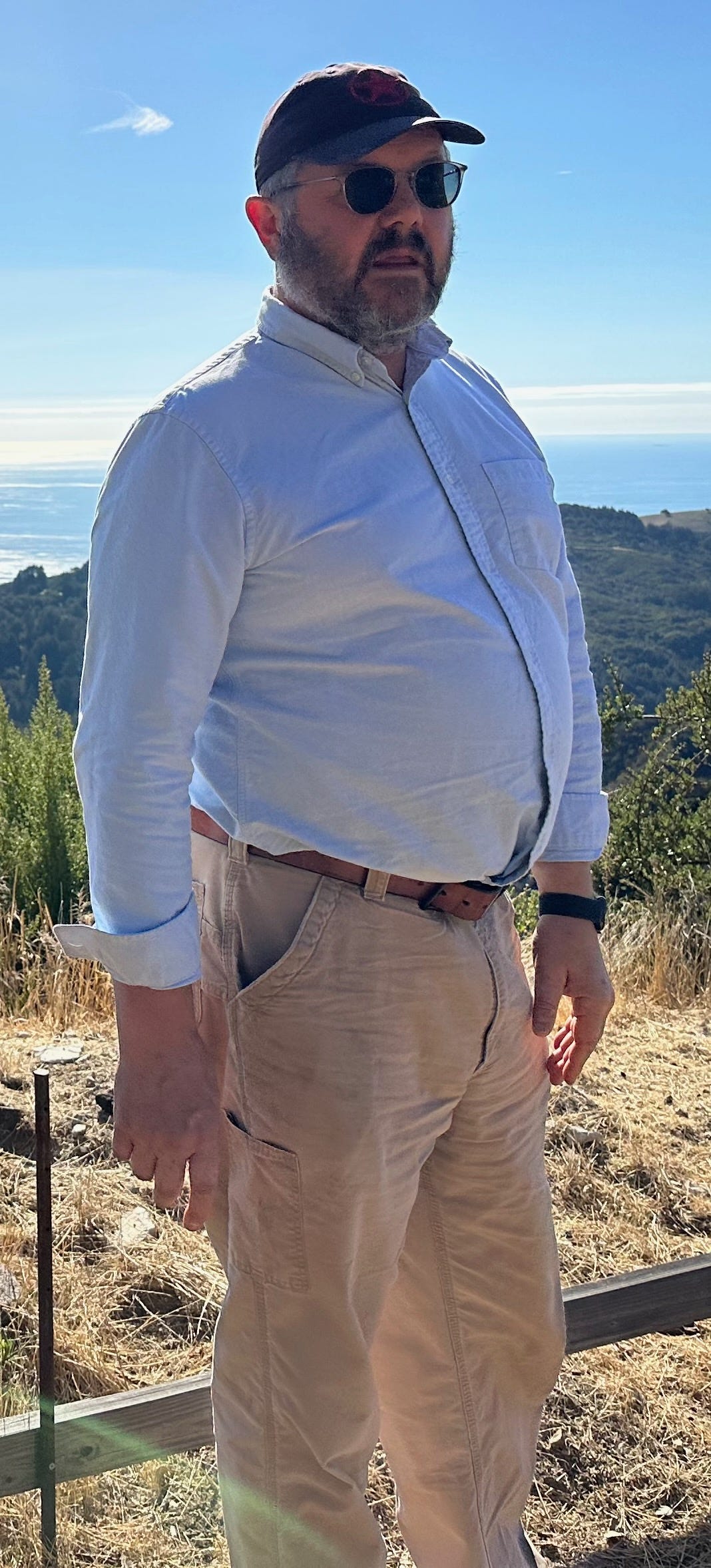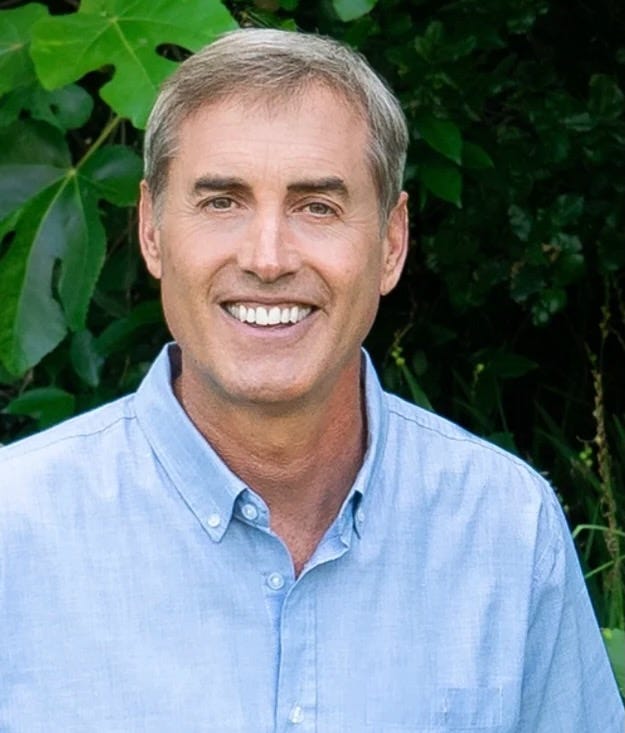I Seem To Have Gotten Fat. But I Know What To Do
And so can you. Here's how. Really. This week, the way change actually happens -- and it's not what you think.
I have gotten fat.
This was me a couple of years ago:
And this is me a couple of weeks ago:
In other words, I need to get back into the gym. Unless I’m okay with lumbering around the world as a Fat, Bald Guy (hint: no, I’m not) I need to start working out, at least three times a week. I know exactly how to do it. I’m doing it now. I did it this morning, as a matter of fact.
But you didn’t, I’ll bet.
Let’s get real. No matter how much you promise yourself that this year will be different, this year will be the year that you go to the gym regularly/spend more time with your kids/write that book, you don’t know what I do. And the odds, therefore, of you actually making a real change are pretty much zero.
You know it. I know it. Everyone knows it. Gyms are packed in January, and empty again in February. Diets are abandoned. People ruefully give up, roll over, and hit the snooze button, again and again and again.
This week’s Specific is going to be the first one that’s not about a thing. I’ve written about comics, shirts, soap, ergometers. These are all objects, things you can touch and see.
This piece is about teaching you what I know about change.
This week I’m going to be writing about an idea, one that can literally make your life into anything you want. And the person behind it. Meet BJ Fogg, who you’ve probably never heard of, and Stanford’s Behavior Design Lab, which he runs. He knows exactly how to get you to go to the gym.
The key to having exactly the kind of life you want isn’t money, or luck (although that helps) or intelligence and it really, really isn’t simply willpower. Willpower requires energy – lots of it – and as soon as you run out of that, you start eating donuts again.
There are basically two ways to change. The first is what I’ll call other-directed. In the case of hitting the gym, that means hiring a trainer. Which is what I’ve done in the past. The trainer’s job is to make you accountable, to motivate you, and basically to see to it that you do what you need to. It works, but it’s expensive.
The second approach is what I’ll call inner-directed. In this case, there’s no one directing you. You’re totally responsible for your behavior. What drives behavior, and results, are habits. Which is what Fogg has spent his entire career studying.
I am, admittedly, a total whore for self-help books. I have read them all, and learned a lot. I’ve also learned a lot about how self-help books usually work. They start with a chapter selling you on the bright, shiny, fit, rich future you’re going to have, and on the expertise and brilliant life of the author, who’s typically interested in also getting you to purchase a seminar, or another book, or something else. Then they get into the specific program.
And with a tiny handful of exceptions, none of these wonderful programs actually make a difference because almost nobody does what they’re supposed to. People go to Tony Robbins seminars, get all pumped up, yell and scream, and it’s donuts two week later. Self-help people never get into how to make yourself actually do what they recommend.
Think about that. Whatever the self-help program is, if you faithfully executed it, with no backsliding and no loss of motivation, it would deliver results. The nature of the actual program is beside the point. It doesn’t really matter, for example, if you swim, row, run, play tennis, or go on long walks. Any or all of them will take off weight. But you have to do something, and self-help people never get into how to motivate yourself to do that, and why you don’t. There’s never any help with the inside of your head.
Fogg is different. That’s all he does. That focus is what makes his work so unique, and so valuable.
A trim, cheerful guy who’s been at Stanford for 25 years, Fogg and his team have dug very, very deep into motivation, behavior and what makes people do what they do and not do what they don’t do. The short answer, lest I be accused of burying the lead, is what Fogg terms “tiny habits”.
That’s it, kids. Tiny habits are the key to everything.
The reason change is so hard is that humans are deeply, fatally connected to their customary patterns of acting. There are all kinds of reasons for this, but the bottom line is that our species goes through life kind of on autopilot. We are very deeply attached to the ways we’ve always done things, the learned behavior and ideas that are so deeply baked into our wiring that we don’t even realize they exist. We are all about our habits. We just are.
One good argument I’ve read about this is that habits deliver cognitive efficiency. I got up this morning and made coffee. I did it the exact same way I’ve done it for weeks (we just moved) and I didn’t think about it. Hell, I wasn’t even really awake. Which means I’m conserving brainpower and energy, getting the task completed very efficiently, and thinking about other things while doing it.
Habits are a cognitive efficiency algorithm. This morning, while making coffee, I had “Alcott” by The National cycling through my head. And I was figuring out where to store all the large pots that are just sitting on the floor right now. And thinking about whether to take some ibuprofen before going to the gym this morning (because old). And so on. You get it. If I had to stop and think about everything I did this morning, I’d still be out there boiling water.
So -- change of any kind requires swimming against the exceedingly powerful current of our habits. Which is really, really hard.
Let’s say you want to start working out. You decide that you’re going to reverse five years of sitting on the couch and binge-watching Netflix RIGHT NOW, TODAY, YAY! You’re going to start working out tomorrow morning. 7 AM. No kidding. Here we go.
Here’s what you have to do to make that happen:
Find several gyms
Tour several gyms
Join one of them
Buy or dig up gear, including but not limited to shorts, t-shirt, socks, towel, gym bag, lock, water bottle
Get out of bed earlier than usual
Figure out what to eat, given that you’re going to be working out this morning, and buying it ahead of time
Get to the gym
Figure out all the machines
Work out alone for an hour with nobody helping, guiding or advising. If you’re overweight, or otherwise self-conscious about your fitness level or appearance, this can be almost impossibly daunting, by the way.
Shower
Return home or go straight to work
And you’re going to have to keep this up three times a week for the rest of your life.
Getting yourself to the gym, in other words, means installing an ongoing, major new set of about a dozen habits. Oh, and if you backslide or fall short, you will then beat yourself up. No wonder it’s so hard.
Fogg’s recommendation would be something like this: scrap the entire enormous plan. Make your goal for today simply to review a list of nearby gyms. And then to reward yourself when you’ve done it. The next day, pick one and make an appointment to visit. And reward yourself again.
Because what you’re trying to do here is not to get fit. You’re trying to install a way of thinking. And above all, you’re trying to defend, and support, your motivation, which is a fragile thing, a baby bird.
Here’s Fogg’s overview of his work, in the introduction to his fantastic book, Tiny Habits: The Small Changes That Change Everything:
Popular thinking about habit formation and change feeds into our impulse to set unrealistic expectations. We know habits matter; we just need more good habits and fewer bad ones. But here we are, still struggling to change. Still thinking it’s our fault. All my research and hands-on experience tells me that this is exactly the wrong mindset. In order to design successful habits and change your behaviors, you should do three things:
· Stop judging yourself
· Take your aspirations and break them down into tiny behaviors
· Embrace mistakes as discoveries and use them to move forward
If you follow the Tiny Habits process, you’ll start taking a different route. Snow will quickly start covering those self-doubting grooves. The new path will soon be the default path. This happens quickly, because with Tiny Habits you change best by feeling good. Not by feeling bad. The process doesn’t require you to rely on willpower, or set up accountability measures, or promise yourself rewards. There is no magic number of days you have to do something. Those approaches aren’t based on the way habits really work, and as a result, they aren’t reliable methods for change. And they often make us feel bad.
None of this is rocket science. But that’s kind of the point. This is what actually works in the real world with real human beings.
Another feature of self-help books is that they always, always make whatever program they’re pushing sound really easy. This is pure marketing strategy. Nobody gets rich telling people they have to do pushups in the rain. It’s a serious challenge to sell hard work and suffering. So they tell you it’s easy – you just have to do the right thing!
Fogg does that, too. The key to tiny habits is that they’re ridiculously easy, and they feel good. However, there’s one major difference between Fogg and everyone else, something that gives him incredible credibility: Silicon Valley. Fogg works at Stanford, which is pretty much Silicon Valley’s think tank. And his conclusions are backed by enormous amounts of research, data and money.
Silicon Valley is the greatest wealth-generation engine in the history of the human race. It is all about developing technologies, and using those technologies to make money. Enormous amounts of money. And increasingly, that means software which is effective at influencing your behavior. Facebook (sorry Meta), for example, is specifically engineered to be addictive, to keep you engaged and clicking. There are hundreds of people who work there whose sole job is to develop and enhance features that get you to behave the way they want you to. Apple spends immense amounts of money ensuring that you love their products and software – that they’re intuitive, user-friendly and look good. I know this because I worked there.
In other words, unlike many of the hand-waving con artists who tell you have to fix your life but are basically just Making Shit Up, Fogg is working with and for companies who have a huge financial interest in understanding why humans do what they do, and how to influence it. Which means research, data and analysis.
And it’s all been boiled down into a set of principles which, on one hand, are deeply subversive. Basically, Fogg asks us to make the tasks easy, but to emphasize persistence, consistency and patience. To lighten the load on our willpower. And to switch from the fantasyland of what’s supposed to work to the reality of what actually works with you, with me, and with everyone else.
And it does. And so can you. Get the book, or watch his TED talk – of course he has a TED talk. Occam’s Razor is real – the right answer is the simple one. So is this one.









